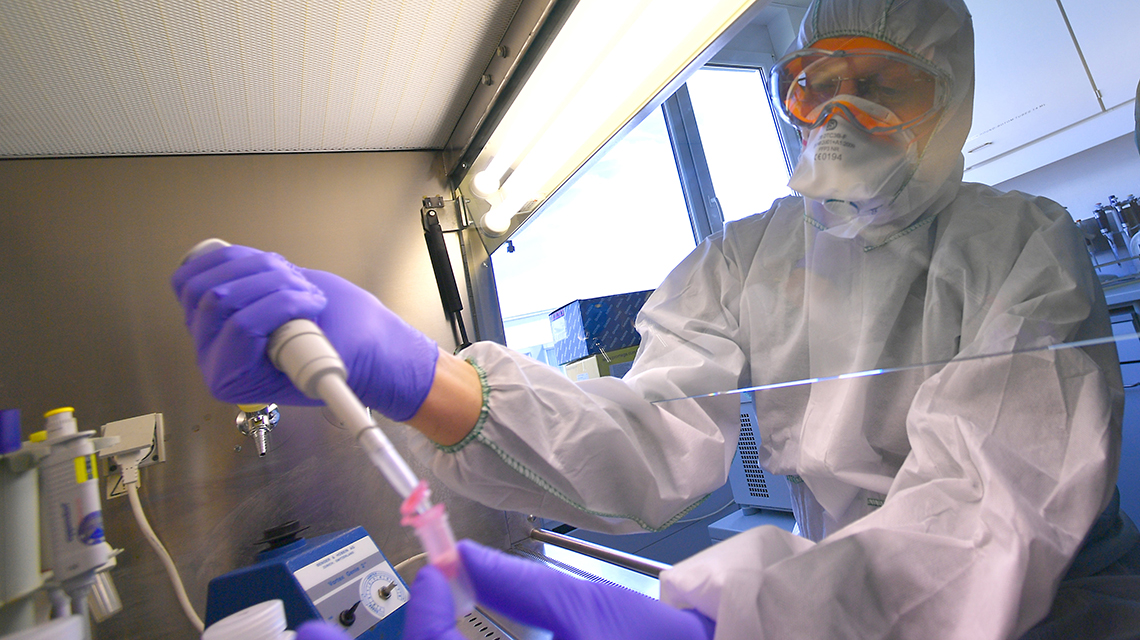
If you would like to learn more about the IAEA’s work, sign up for our weekly updates containing our most important news, multimedia and more.
Study proves effectiveness of alternative test kits for COVID-19
Joanne Liou

A recent study tested the performance and quality of alternative test kits used for the routine detection of the COVID-19 virus. (Photo: D. Calma/IAEA)
The primordial days of the COVID-19 outbreak led to a rapid surge in demand — and subsequent shortage — of many consumables, from household goods and protective equipment to the ingredients and substances needed to test for the virus. As the world grappled with the newfound need to mass-test for COVID-19, laboratories turned to real-time reverse transcription–polymerase chain reaction (real-time RT–PCR). Real-time RT–PCR is the most accurate laboratory method to detect, track and study COVID-19, however, its widespread use strained resources and led some laboratories to seek more readily available and cheaper alternatives.
A study to test the performance and quality of some of these alternative resources was recently conducted by the IAEA and the Food and Agriculture Organization of the United Nations (FAO), in collaboration with the Austrian Agency for Health and Food Safety (AGES). Its results have implications for the ongoing fight against COVID-19 in developing countries and beyond.
Reagents for reaction
Reagents are the substances, compounds, primers, probes, enzymes and buffers needed in laboratory tests. Like the essential ingredients of a recipe, they are key to facilitating a chemical reaction and ensuring the proper final result — the salt and butter, so to speak.
“In a situation of increased demand such as during the COVID-19 crisis, many laboratories might quickly find themselves in a situation where they can no longer obtain reagents from their usual sources and are forced to switch to other providers of reagents or other ad hoc molecular diagnostic kits than the ones they are used to,” said Adi Steinrigl, Deputy Head of the Molecular Biology Department at AGES. “Labs doing real-time RT–PCR tests rely on trusted sources of reagents, usually in the form of a master mix or ready-to-go diagnostic kit solutions, called ad hoc molecular diagnostic kits.”
A master mix is a premixed solution that has all of the components for a real-time RT–PCR reaction and is not sample-specific, meaning the same reagents used to detect COVID-19 can also be used to detect other viruses. Ad hoc kits are for specific diseases and pathogens.
In April 2020, in collaboration with AGES, the Joint FAO/IAEA Centre of Nuclear Techniques for Food and Agriculture launched a study to assess and compare eight master mixes and three ad hoc kits developed by companies based in Austria, Germany, Japan, the Republic of Korea, the United Kingdom and the United States of America.
The study included the most common types of master mixes used and available on the international market among the many molecular assays, or tests, that are commercialized for the diagnosis of COVID-19. As of July 2021, 388 were listed by the Foundation for Innovative New Diagnostics.
Promising results
At the FAO–IAEA laboratories in Seibersdorf, Austria, IAEA experts tested 178 clinical samples provided by AGES, using each of the 11 commercial kits and master mixes. The results of the study established that all the tested master mixes and ad hoc kits can be used for the routine detection of the COVID-19 virus.
“The bottom line is that the tested products provided results that are similar to what can be obtained if using the reagents recommended by the World Health Organization (WHO),” said Giovanni Cattoli, Head of the Animal Production and Health Laboratory at the Joint FAO/IAEA Centre. “In a country where reagents for the recommended protocols are not available or are extremely expensive, laboratories can replace them with some of the other reagents included in the study and achieve similarly accurate results. With this study, we validated alternatives so that laboratories around the world can utilize available reagents to mass-test populations for COVID-19, therefore making the tests more accessible.”
The time needed for and costs of carrying out a real-time RT–PCR test vary, especially among different countries. A real-time RT–PCR test typically takes a couple of hours to complete, from receiving samples to issuing results, and the costs of reagents depend on the company and reagent type. Overall, excluding human resource costs, tests can cost from around €7 to €20, Cattoli added.
Steinrigl agreed that reagents and ad hoc molecular diagnostic kits might differ considerably in their costs: “Comparing the performance of reagents can actually save money. We can see cheaper solutions are not necessarily any less accurate than the more expensive ones.”
The procedures and results of the study have been shared with the IAEA Veterinary Diagnostic Laboratory (VETLAB) Network, in which some labs have been requested by national authorities to provide testing for COVID. The VETLAB network includes 46 countries in Africa and 19 in Asia. The study was also published online by the Journal of Virological Methods in June 2021.
“These types of studies are needed for other transboundary animal and zoonotic diseases,” Cattoli said. The IAEA is conducting a similar study for African swine fever. “It is important to have an idea of what type of reagents can be used to run real-time RT–PCR testing for these diseases and ensure that the results are equal to the those produced by the recommended protocols.”

